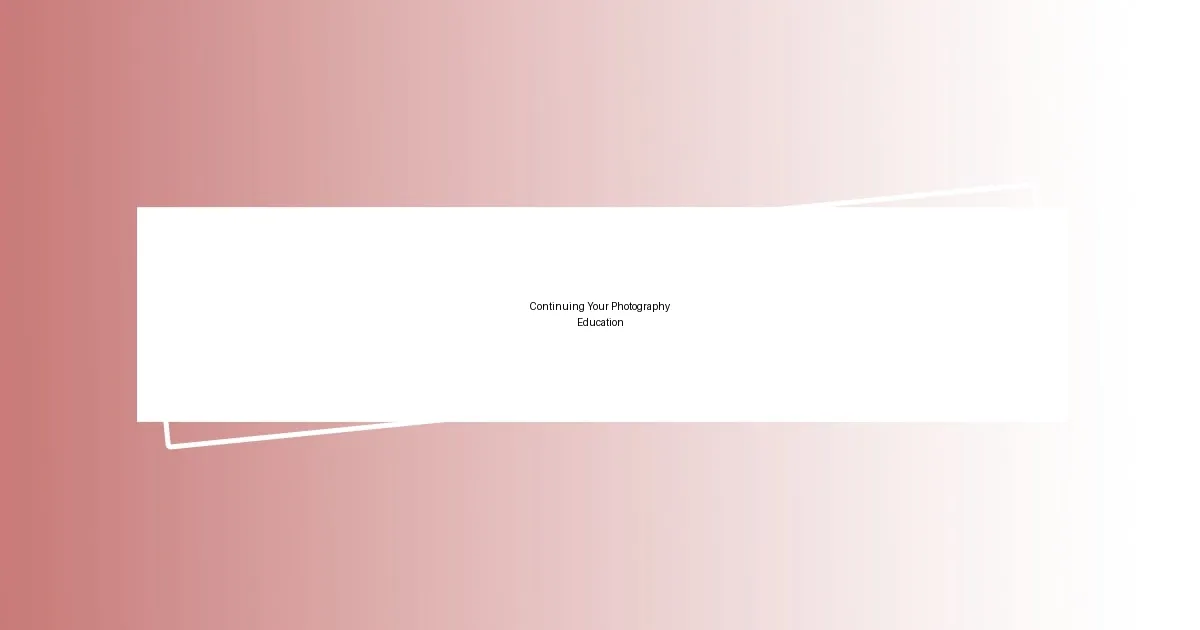Key takeaways:
- Photography workshops offer hands-on practice, expert insights, and foster a sense of community among participants, enhancing creativity and skills.
- Choosing the right workshop involves aligning with personal interests, considering the instructor’s expertise, and opting for smaller class sizes for tailored feedback.
- Engaging actively with instructors and participants can lead to valuable networking opportunities, mentorship, and collaborative projects post-workshop.
- Continuing photography education through online courses and attending events helps expand skills and stay updated with industry trends.

Benefits of Photography Workshops
One of the most significant benefits I found in photography workshops is the opportunity to learn from experienced instructors. During a workshop I attended, a seasoned photographer provided techniques that completely shifted my perspective on lighting. I still remember standing under a golden hour sky, realizing how playful shadows could elevate a photograph from ordinary to extraordinary. Isn’t it fascinating how a few tips can unlock your creativity?
Workshops also foster a sense of community among participants. I vividly recall chatting with fellow enthusiasts during a break, sharing our struggles and breakthroughs. That camaraderie made each moment feel less intimidating and more like a shared journey. Have you ever felt that rush of inspiration from being around like-minded people? It’s a powerful driving force that can motivate you to push your creative boundaries.
Lastly, hands-on practice is invaluable in a workshop setting. I still think about my first photo walk where I experimented with new techniques in real-time. There’s something exhilarating about applying what you’ve just learned, don’t you think? Whether it’s capturing the movement of a busy street or the stillness of nature, these experiences solidify your skills and provide lasting memories.

Choosing the Right Workshop
Choosing the right photography workshop can feel overwhelming with so many options available. It’s essential to consider what you want to gain from the experience. Personally, I found it helpful to look for workshops that align with my specific interests, like portrait photography or landscape shooting. When I focused on my passion, the learning became more impactful and enjoyable, and I felt motivated to absorb every bit of knowledge.
Another factor that I recommend paying attention to is the instructor’s expertise. I remember taking a workshop led by a photojournalist who had covered major global events. His firsthand experiences and insights were incredible. It’s this kind of real-world knowledge that can turn a good workshop into a great one. So, ask yourself: Who is teaching the workshop, and what unique experiences do they bring to the table?
Lastly, consider the size of the class. Smaller groups tend to foster more personal interaction and feedback, which I found to be crucial for my growth. In one workshop with just five participants, I received tailored advice that transformed my approach to framing shots. That kind of individualized attention makes a significant difference in your learning journey.
| Workshop Type | Size |
|---|---|
| Beginner Basics | Large (15+) |
| Advanced Techniques | Small (5-10) |
| Specialized Genres | Medium (10-15) |

Preparing for Your First Workshop
Preparing for your first photography workshop is both exciting and a bit nerve-wracking, and I completely understand that feeling. As I prepared for mine, I remember jotting down all the things I wanted to learn and experiment with. It helped me clarify my goals and focus my energy. It’s natural to feel apprehensive, but being organized can truly enhance the experience.
Here’s a handy checklist to help you get ready:
- Research the Workshop: Look into the structure and topics covered.
- Gather Your Gear: Bring your camera, lenses, and any accessories you might need.
- Practice Basics: Brush up on techniques like exposure and composition.
- Set Aside Time to Reflect: Think about what you hope to achieve and any specific questions you want to ask.
- Prepare Mentally: Embrace the learning curve and be ready to step out of your comfort zone.
Each of these steps can make your workshop experience more fulfilling. I recall walking into my first class, heart racing, only to find everyone else feeling the same mix of excitement and anxiety. Connecting with others who share that initial apprehension can turn into a source of support and inspiration throughout the workshop.

Tips for Engaging with Instructors
Engaging with your instructors can truly enhance your workshop experience. I learned that asking questions during demonstrations not only clarifies concepts but also showcases your enthusiasm for learning. I remember a moment when I pointed out something specific in a photo critique. The instructor was thrilled I was paying attention, and it led to a deeper discussion that provided me with invaluable insights.
Another tip is to share your own perspective and experiences related to photography. When I opened up about a project I was struggling with, the instructor offered tailored advice that really resonated with my challenges. This interaction not only made me feel valued but also widened my learning horizon through their expert lens. Have you ever considered that your unique experiences could spark meaningful conversations?
Lastly, don’t hesitate to reach out after the workshop. I found that following up with an email expressing what I enjoyed or asking additional questions fostered a connection that extended beyond the classroom. It surprised me how open instructors were to continuing the dialogue. Engaging with them post-workshop has led to ongoing mentorship and has provided me with insights that books or online courses simply can’t replicate.

Making the Most of Networking
Networking in photography workshops can often be the most enriching part of the experience. I remember meeting a fellow participant during a break, who shared her passion for street photography. She suggested exploring camera settings in real-time scenarios, which led to an unexpected collaboration. Isn’t it fascinating how a casual conversation can spark creative projects?
Building relationships with other attendees is key, and I learned this firsthand when we formed a small critique group. We exchanged feedback on our portfolios, which not only improved our work but also built a strong support system. Have you thought about how mutual encouragement can elevate your skills? It feels empowering to learn from those who are on the same journey, exploring different perspectives and techniques together.
Lastly, don’t underestimate the power of social media for maintaining those connections. After the workshop, I took the time to follow up with new friends on Instagram and share our work. This simple act transformed our workshop camaraderie into a lasting community. I still find motivation and inspiration from their posts, and it’s incredible how those initial workshop connections can turn into lifelong professional relationships.

Post-Workshop Projects to Try
After attending photography workshops, one of the most invigorating projects I dove into was creating a themed photo series. With a few suggestions from my instructor about narrative storytelling through images, I chose “Urban Isolation” as my concept. This project pushed me to explore my city during off-peak hours, capturing the stark contrast of bustling life against deserted streets. Have you ever felt that a theme can transform your perspective and ignite your creativity?
Another engaging post-workshop project is to develop a collaborative zine with fellow attendees. I remember brainstorming this idea after discussing our favorite photography styles. We all contributed a few images, alongside our thoughts, which not only helped me refine my editing skills but also allowed everyone to see their work in a new light. How energizing it can be to witness different interpretations of the same theme!
Lastly, I found immense value in reviewing and revisiting the materials provided by the instructor. I created a set of personal guidelines based on the critiques I received, focusing on elements like composition and lighting. This exercise became a cornerstone of my practice, helping me identify my unique voice as a photographer. Are you taking the time to translate what you learn into actionable steps? I truly believe that these reflections can drive your growth as an artist.

Continuing Your Photography Education
Continuing your photography education opens doors to endless possibilities, both creatively and technically. For instance, I recall attending an advanced lighting workshop where I learned about different light modifiers. Experimenting with these tools during the session sparked a whole new appreciation for controlling light in my images. Isn’t it thrilling to expand your toolkit and unlock fresh potential in your photography?
Another aspect I found invaluable was participating in online courses after the workshops. One summer, I enrolled in a course focused on post-processing techniques. I must admit, the joy I felt when my images transformed after applying what I learned was indescribable. Have you ever experienced that exhilarating moment when a previously flat image suddenly comes to life with a few edits? It’s like watching the magic unfold right before your eyes.
Additionally, I’ve made it a habit to attend webinars and photography talks, which expose me to new perspectives and ideas. Last fall, I tuned into a panel discussion featuring renowned photographers discussing trends in the industry. Listening to their stories and experiences made me realize how vital it is to stay updated. How do you keep up with the ever-evolving world of photography? I find that by regularly immersing myself in discussions and insights from professionals, I can truly elevate my craft and stay inspired.














